Hello, I’m new to the thread and and didn’t receive any replies and it was probably the title. I’m a new owner of a 66 /427 and I’m concerned with what fuel is correct. Is an additive also required? Thanks Great blogg
Question 91 or 94 Fuel?
- Thread starter Bruce007
- Start date
You are using an out of date browser. It may not display this or other websites correctly.
You should upgrade or use an alternative browser.
You should upgrade or use an alternative browser.
I think either 91 or higher is fine, but based on the age of your vehicle I would suggest that you check that whichever grade you use does not have ethanol.
As I recall, Shell, Esso and Mobil's 91 does not have ethanol but Mobil's 93 does have it. So you need to do some research. Now if your car is a daily driver it may not be much of an issue but if you store it for any period of time then you do not want ethanol in the system.
I have an old 77 Oldsmobile with 403 motor (no mods, factory stock) that is supposed to run on regular ethanol fuel but pings like crazy with it. Run Shell or Esso 91 and it purrs. Just my thoughts based on my experience.
As I recall, Shell, Esso and Mobil's 91 does not have ethanol but Mobil's 93 does have it. So you need to do some research. Now if your car is a daily driver it may not be much of an issue but if you store it for any period of time then you do not want ethanol in the system.
I have an old 77 Oldsmobile with 403 motor (no mods, factory stock) that is supposed to run on regular ethanol fuel but pings like crazy with it. Run Shell or Esso 91 and it purrs. Just my thoughts based on my experience.
I agree with @ByronF
New computer-controlled engines are designed to manage mixtures and timing with specific gasket and internal materials to deal with ethanol in the fuel. Not to mention the fuel delivery and storage systems that ethanol will damage or may destroy in your car.
A good ethanol-free fuel should be all you need. As far as octane it may run fine on 87 but that will be determined by your compression ratio. (which I don't know for your engine) So a 91-94 would be a safe bet and the price difference is irrelevant in my opinion as this is not your daily driver. It is a toy to enjoy... so enjoy it properly.
Additives: For storage stabilizer, many of us use "Stabil" but there are other good brands too. Some are designed specifically designed to neutralize the effects of ethanol.
For octane boost... well you will have to find out what the minimum required octane value is for this engine. However, you will likely be ok on pump fuel with a stock engine...unless you need to replace the lead component found in the gasoline compositions from that era. Yes, you will need to do some real research with GM engineering behind it.
There are many threads here on this subject but they are not relevant generally to a car in your vintage.
Sounds like an exciting car.
New computer-controlled engines are designed to manage mixtures and timing with specific gasket and internal materials to deal with ethanol in the fuel. Not to mention the fuel delivery and storage systems that ethanol will damage or may destroy in your car.
A good ethanol-free fuel should be all you need. As far as octane it may run fine on 87 but that will be determined by your compression ratio. (which I don't know for your engine) So a 91-94 would be a safe bet and the price difference is irrelevant in my opinion as this is not your daily driver. It is a toy to enjoy... so enjoy it properly.
Additives: For storage stabilizer, many of us use "Stabil" but there are other good brands too. Some are designed specifically designed to neutralize the effects of ethanol.
For octane boost... well you will have to find out what the minimum required octane value is for this engine. However, you will likely be ok on pump fuel with a stock engine...unless you need to replace the lead component found in the gasoline compositions from that era. Yes, you will need to do some real research with GM engineering behind it.
There are many threads here on this subject but they are not relevant generally to a car in your vintage.
Sounds like an exciting car.
Many Thanks, very helpful. Lol Hopefully the car is as good as my research leeds me to believe.Haven’t seen it yet.
We are all excited to see it too.

Bruce007........ you're awaiting the arrival of a 66 427?%$%!  That engine puts out a great rumble, congrats and post pics.
That engine puts out a great rumble, congrats and post pics.
 That engine puts out a great rumble, congrats and post pics.
That engine puts out a great rumble, congrats and post pics.It’s sight unseen so fingers crossed it’s good.
Attachments
-
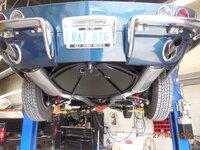 CC800B17-44D9-4517-A580-C6A102181542.jpeg421.8 KB · Views: 44
CC800B17-44D9-4517-A580-C6A102181542.jpeg421.8 KB · Views: 44 -
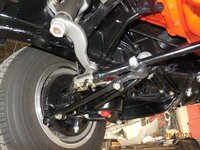 844ABD13-3483-4D15-941E-021EC42253E3.jpeg473.6 KB · Views: 44
844ABD13-3483-4D15-941E-021EC42253E3.jpeg473.6 KB · Views: 44 -
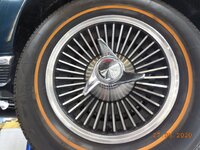 CA4577CC-B24D-487B-82CA-59AE4F04F73E.jpeg399.1 KB · Views: 43
CA4577CC-B24D-487B-82CA-59AE4F04F73E.jpeg399.1 KB · Views: 43 -
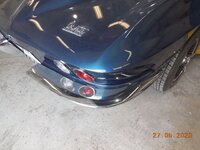 AC7D9C01-4109-439C-92A7-CED4FC65DC39.jpeg465.5 KB · Views: 44
AC7D9C01-4109-439C-92A7-CED4FC65DC39.jpeg465.5 KB · Views: 44 -
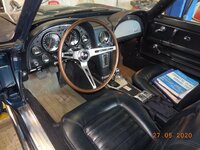 9FCB0C53-D94F-4B72-AFD7-72849EA75568.jpeg497.1 KB · Views: 44
9FCB0C53-D94F-4B72-AFD7-72849EA75568.jpeg497.1 KB · Views: 44 -
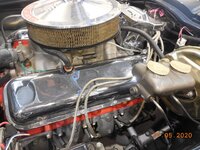 F6AC60D7-5FB2-46EA-933D-A77776B2F88B.jpeg517 KB · Views: 38
F6AC60D7-5FB2-46EA-933D-A77776B2F88B.jpeg517 KB · Views: 38
Hello, I’m new to the thread and and didn’t receive any replies and it was probably the title. I’m a new owner of a 66 /427 and I’m concerned with what fuel is correct. Is an additive also required? Thanks Great blog
In 1997, we bought a stock 1969 375 hp 396 M21 4 speed 4.10 geared Chevelle. Over the next 15 years we put about 37,000 miles on the car running Mobil1 5 W30 oil and Shell premium non ethanol 91 octane gas. Running #93 primary jets and with a suitable advance curve dialed in, we had zero problems with the engine. Eventually, the police in our area started checking for missing smog equipment, so I bought repro manifolds and smog pump to make the car legal. It ran just as well as with the headers. If there was a difference in power output, it would take a dyno to show it.
Hi Bruce. Congrats on the new ride. Exciting times ahead.
Fuel suggestions would be what people have responded with above.
91-94 octane depending on compression ratio.. and NO methanol.
Chevron 94 is what most of the high compression motors run around here.
Contact me if you need any local Corvette details... parts, service, information.
I’m in South Langley
graham
Fuel suggestions would be what people have responded with above.
91-94 octane depending on compression ratio.. and NO methanol.
Chevron 94 is what most of the high compression motors run around here.
Contact me if you need any local Corvette details... parts, service, information.
I’m in South Langley
graham
It depends if the engine was altered from stock. If it is a complete 427 all stock from the 60's, you'll need to add a lead additive to the fuel. The new big blocks 454, LS types don't need the additive. You'll know if you need the additive when you hear what sounds and feels like floating vales. (common sound from overtacking).
Hi Bruce, Based on those few pics you've posted, that is a fabulous looking car and in great shape. Congrats!
There are 2 versions of 427 for 66. I see a 6500 tach redline on the picture of your interior. If its the original engine, then what you have is a 425 HP, High Perf engine, running 11.0:1 compression. That is a very strong big boy that is very thirsty and needs lots of protein!
These Mark IV engines in the late 60s were not designed for Ethanol, and unleaded fuels. So you should definitely follow all the good recommendations you've already received, and go for the highest Octane grade fuel with No Ethanol, that you can find.
You should also consider adding a container of lead substitute with every fill-up to protect the valve stems and seats. Before unleaded, leaded fuels inadvertently helped protect the valves by creating a lead particle build-up on the seats that acted as a cushion and softened the blow each time a valve closed and contacted on its seat. There are plenty of articles around saying they have had no issues with the valves when running unleaded. Maybe its just a placebo, but I prefer not to take any chances.
One little note. If you are like most drivers, you will occasionally find yourself looking for a gas station in the middle of nowhere and end up having to fill-up with whatever fuel you could find. So always store some lead substitute and octane booster in your car just in case.
Enjoy your new ride!
Luke
There are 2 versions of 427 for 66. I see a 6500 tach redline on the picture of your interior. If its the original engine, then what you have is a 425 HP, High Perf engine, running 11.0:1 compression. That is a very strong big boy that is very thirsty and needs lots of protein!
These Mark IV engines in the late 60s were not designed for Ethanol, and unleaded fuels. So you should definitely follow all the good recommendations you've already received, and go for the highest Octane grade fuel with No Ethanol, that you can find.
You should also consider adding a container of lead substitute with every fill-up to protect the valve stems and seats. Before unleaded, leaded fuels inadvertently helped protect the valves by creating a lead particle build-up on the seats that acted as a cushion and softened the blow each time a valve closed and contacted on its seat. There are plenty of articles around saying they have had no issues with the valves when running unleaded. Maybe its just a placebo, but I prefer not to take any chances.
One little note. If you are like most drivers, you will occasionally find yourself looking for a gas station in the middle of nowhere and end up having to fill-up with whatever fuel you could find. So always store some lead substitute and octane booster in your car just in case.
Enjoy your new ride!
Luke
Hi Bruce, Based on those few pics you've posted, that is a fabulous looking car and in great shape. Congrats!
There are 2 versions of 427 for 66. I see a 6500 tach redline on the picture of your interior. If its the original engine, then what you have is a 425 HP, High Perf engine, running 11.0:1 compression. That is a very strong big boy that is very thirsty and needs lots of protein!
These Mark IV engines in the late 60s were not designed for Ethanol, and unleaded fuels. So you should definitely follow all the good recommendations you've already received, and go for the highest Octane grade fuel with No Ethanol, that you can find.
You should also consider adding a container of lead substitute with every fill-up to protect the valve stems and seats. Before unleaded, leaded fuels inadvertently helped protect the valves by creating a lead particle build-up on the seats that acted as a cushion and softened the blow each time a valve closed and contacted on its seat. There are plenty of articles around saying they have had no issues with the valves when running unleaded. Maybe its just a placebo, but I prefer not to take any chances.
One little note. If you are like most drivers, you will occasionally find yourself looking for a gas station in the middle of nowhere and end up having to fill-up with whatever fuel you could find. So always store some lead substitute and octane booster in your car just in case.
Enjoy your new ride!
Luke
Luke,many thanks,you guys have been so helpful. Do you have any suggestions for a lead additive and Octane booster. I’m in Vancouver so Lordco is close so I can give them a try. Cheers and thanks again.
Hi Bruce, Based on those few pics you've posted, that is a fabulous looking car and in great shape. Congrats!
There are 2 versions of 427 for 66. I see a 6500 tach redline on the picture of your interior. If its the original engine, then what you have is a 425 HP, High Perf engine, running 11.0:1 compression. That is a very strong big boy that is very thirsty and needs lots of protein!
These Mark IV engines in the late 60s were not designed for Ethanol, and unleaded fuels. So you should definitely follow all the good recommendations you've already received, and go for the highest Octane grade fuel with No Ethanol, that you can find.
You should also consider adding a container of lead substitute with every fill-up to protect the valve stems and seats. Before unleaded, leaded fuels inadvertently helped protect the valves by creating a lead particle build-up on the seats that acted as a cushion and softened the blow each time a valve closed and contacted on its seat. There are plenty of articles around saying they have had no issues with the valves when running unleaded. Maybe its just a placebo, but I prefer not to take any chances.
One little note. If you are like most drivers, you will occasionally find yourself looking for a gas station in the middle of nowhere and end up having to fill-up with whatever fuel you could find. So always store some lead substitute and octane booster in your car just in case.
Enjoy your new ride!
Luke
Fantastic information and great advice. Very well done

Bruce, If you have a Canadian Tire in your area, you are all set. They carry a good selection of octane Booster. My preference is STP as it seems to perform better, but it comes in different sizes so you need to read to make sure you use the right amount. Gumout is also very good and practical as the 296ml container is about right for a full tank. The lead substitute I used was 250ML Motomaster brand also right amount for full tank. My car has been off the road for a couple years for some work and in that time, they have changed to Certified brand which I havn't tried yet. Container size is different, so you need to check for amount to use. I'm sure auto parts also have decent choice but thats the type of thing I usually buy in bulk when it comes on sale, save a couple of bucks for that premium fuel!
BTW, you may see and be tempted by Petro Canada 94 Octane fuel, but be aware it contains 10% Ethanol, not good for your older vintage engine.
Cheers, Luke
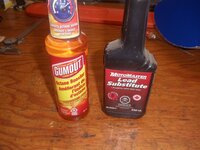
BTW, you may see and be tempted by Petro Canada 94 Octane fuel, but be aware it contains 10% Ethanol, not good for your older vintage engine.
Cheers, Luke

Similar threads
-
-
-
Anyone Worried about Dealer 'joyrides' car is in for Service??
- Started by butsy
- Replies: 10
-
Why test driving a Corvette is crucial before purchase
- Started by niktester2
- Replies: 0
-
Users who are viewing this thread
Total: 1 (members: 0, guests: 1)